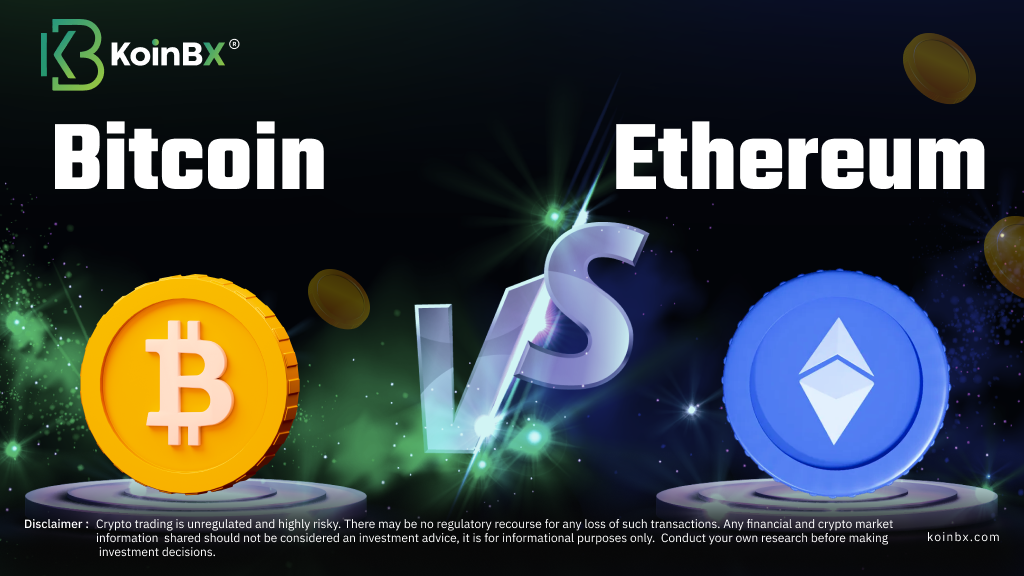In the ever-evolving landscape of crypto assets, Bitcoin and Ethereum stand out as the two most prominent players. While both crypto assets share some similarities, they also have significant differences that set them apart. This article delves into a comparative analysis of Bitcoin and Ethereum, exploring their unique features, use cases, and potential for future growth.
What is Bitcoin?
Bitcoin, often referred to as digital gold, was the first crypto asset, created in 2009 by an anonymous entity known as Satoshi Nakamoto. Bitcoin operates on a decentralized network using blockchain, which ensures secure and transparent transactions. It is primarily seen as a store of value and a hedge against inflation, much like traditional gold.
Key Features of Bitcoin
- Decentralization: Bitcoin operates without a central authority, relying on a peer-to-peer network to verify transactions.
- Limited Supply: Only 21 million Bitcoins will ever exist, which creates scarcity and drives value.
- Security: Bitcoin's robust encryption and decentralized nature make it highly secure against fraud and hacking.
What is Ethereum?
Launched in 2015 by Vitalik Buterin, Ethereum is more than just a crypto asset. It is a decentralized platform that enables developers to build and deploy smart contracts and decentralized applications (dApps). Ether (ETH) is the native crypto asset of the Ethereum network, used to fuel these applications and facilitate transactions.
Key Features of Ethereum
- Smart Contracts: Self-executing contracts with the terms of the agreement directly written into code, enabling automated and trustless transactions.
- dApps: Decentralized applications built on the Ethereum blockchain, ranging from finance to gaming.
- Scalability: Ethereum is undergoing upgrades, such as Ethereum 2.0, to improve scalability and reduce transaction fees
Bitcoin vs Ethereum: Key Differences
Purpose
- Bitcoin: Primarily a digital currency and store of value.
- Ethereum: A platform for decentralized applications and smart contracts.
Transaction Speed
- Bitcoin: Slower transaction times, averaging around 10 minutes per transaction.
- Ethereum: Faster transactions, typically completed in seconds to minutes.
Consensus Mechanism
- Bitcoin: Uses Proof of Work (PoW) for mining and validating transactions.
- Ethereum: Currently transitioning from Proof of Work (PoW) to Proof of Stake (PoS) with Ethereum 2.0.
You can also read about our latest blog on comparative analysis >> "shiba inu vs dogecoin"
Use Cases
Bitcoin Use Cases
- Store of Value: Often referred to as digital gold, Bitcoin is used as a hedge against inflation.
- Peer-to-Peer Transactions: Enables direct transactions without intermediaries.
Ethereum Use Cases
- Decentralized Finance (DeFi): Platforms for lending, borrowing, and trading without traditional banks.
- Non-Fungible Tokens (NFTs): Digital assets representing ownership of unique items, such as art and collectibles.
- dApps and Smart Contracts: A wide range of applications from gaming to supply chain management.
Future Prospects
Bitcoin's Future
Bitcoin's future is often seen as a long-term store of value and a potential standard for digital currencies. Its limited supply and growing acceptance by institutional investors may drive its value higher.
Ethereum's Future
Ethereum's future is closely tied to the success of its network upgrades and the continued growth of the DeFi and NFT markets. Ethereum 2.0 aims to solve scalability issues, potentially making Ethereum the backbone of the decentralized internet.
Conclusion
Bitcoin and Ethereum are two pioneering crypto assets with unique features and distinct use cases. Bitcoin's strength lies in its simplicity and security as a digital gold, while Ethereum offers a versatile platform for innovation in decentralized applications. Understanding their differences and potential can help investors and enthusiasts make informed decisions in the dynamic world of crypto assets.
Download KoinBX Android App | Download KoinBX iOS App
Disclaimer: Any financial and crypto market information shared should not be considered investment advice. It is for informational purposes only. Conduct your own research before making investment decisions. Crypto trading is unregulated and highly risky. There may be no regulatory recourse for any loss of such transactions






Comments